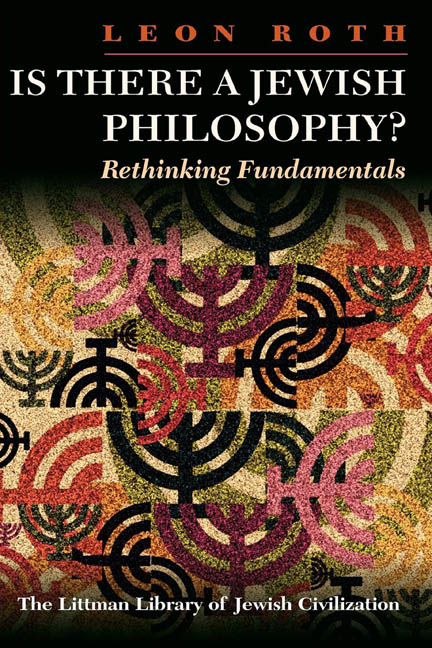Book contents
- Frontmatter
- Dedication
- Contents
- Publisher's Note
- Foreword
- Note
- Is there a Jewish Philosophy?
- Imitatio Dei and the Idea of Holiness
- Jewish Thought as a Factor in Civilization
- The Significance of Biblical Prophecy for Our Time
- Some Reflections on the Interpretation of Scripture
- Baruch Spinoza: His Religious Importance for the Jew of Today
- Judaism: The Elements
- Authority, Religion, and Law
- Moralization and Demoralization in Jewish Ethics
- Mysticism, Thick and Thin
- Back To, Forward From, Ahad Ha'am?
- Maimonides
- Bibliography of the Writings of Leon Roth
- Index
Moralization and Demoralization in Jewish Ethics
- Frontmatter
- Dedication
- Contents
- Publisher's Note
- Foreword
- Note
- Is there a Jewish Philosophy?
- Imitatio Dei and the Idea of Holiness
- Jewish Thought as a Factor in Civilization
- The Significance of Biblical Prophecy for Our Time
- Some Reflections on the Interpretation of Scripture
- Baruch Spinoza: His Religious Importance for the Jew of Today
- Judaism: The Elements
- Authority, Religion, and Law
- Moralization and Demoralization in Jewish Ethics
- Mysticism, Thick and Thin
- Back To, Forward From, Ahad Ha'am?
- Maimonides
- Bibliography of the Writings of Leon Roth
- Index
Summary
To explain my title, I offer two illustrations. The first is well known, and I adduce it only because its significance is often overlooked.
The Mishnah in Sanhedrin recounts the way in which the old Jewish court tried to bring home to witnesses in a capital case the uniqueness of human life and the consequent responsibility of their position. The court would have them brought in, we read, and would admonish them as follows:
You are not to speak from guesswork or from gossip or from reliance on a third party however trustworthy in your eyes. You must understand that cases involving the death penalty are not like those which involve only money. In money cases a false witness can atone for the damage he has caused by a money payment. In capital cases there rests on his head the blood of the condemned man and the blood of the descendants [who may have yet to be born to him] to the end of days.
The Mishnah then goes on:
It is for this that man was created one, to instruct us that whoever destroys one life, it is accounted to him by Scripture as if he had destroyed a whole world, and whoever preserves one life, it is accounted to him by Scripture as if he had preserved a whole world.
AS it stands thus, this statement is completely general. The original creation was of one man, and from that one man came the life of all human beings. To preserve one life is thus to preserve a whole world of humanity: to destroy one life is to destroy a whole world. This is obviously the sense meant, and this is obviously the proper text; and so we find it-I am quoting the late Professor J. N. Epstein-in all exact manuscripts and early references. Our printed texts however insert the word meyisrael, and therefore read not ‘whoever preserves or destroys one life’, but ‘whoever preserves or destroys one Jew'. The addition of the word meyisrael produces a sudden, and ludicrous, deflation.
A similar point may be noted in out text of a verse (21) in the last chapter of Isaiah.
- Type
- Chapter
- Information
- Is There a Jewish Philosophy?Rethinking Fundamentals, pp. 128 - 143Publisher: Liverpool University PressPrint publication year: 1999

